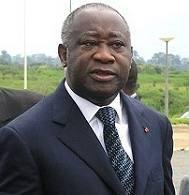Laurent Gbagbo
| Laurent Gbagbo | |
|---|---|
 |
|
| 4th President of Côte d'Ivoire | |
|
In office 26 October 2000 – 11 April 2011 |
|
| Prime Minister |
Seydou Diarra Pascal Affi N'Guessan Seydou Diarra Charles Konan Banny Guillaume Soro Gilbert Aké |
| Preceded by | Robert Guéï |
| Succeeded by | Alassane Ouattara |
| Personal details | |
| Born |
May 31, 1945 Gagnoa, French West Africa |
| Nationality | Ivorian |
| Political party | Ivorian Popular Front |
| Spouse(s) | Simone Gbagbo |
| Alma mater | Paris Diderot University |
| Religion | Roman Catholicism |
| Website | Official website |
Laurent Gbagbo (Gagnoa Bété: Gbagbo [ɡ͡baɡ͡bo]; French pronunciation: [loʁɑ̃ baɡbo]; born 31 May 1945) was the President of Côte d'Ivoire from 2000 until his arrest in April 2011.
A historian by profession, as well as an amateur chemist and physicist, Gbagbo was imprisoned in the early 1970s and again in the early 1990s, and he lived in exile in France during much of the 1980s as a result of his union activism. Gbagbo founded the Ivorian Popular Front (FPI) in 1982 and ran unsuccessfully for President against Félix Houphouët-Boigny at the start of multi-party politics in 1990. He also won a seat in the National Assembly of Côte d'Ivoire in 1990.
Gbagbo claimed victory after Robert Guéï, head of a military junta, barred other leading politicians from running in the October 2000 presidential election. The Ivorian people took to the streets, toppling Guéï. Gbagbo was then installed as President.
Following the 2010 presidential election, Gbagbo challenged the vote count, alleging fraud. He called for the annulment of results from nine of the country's regions. Alassane Ouattara was declared the winner and was recognized as such by election observers, the international community, the African Union (AU), and the Economic Community of West African States. However, the Constitutional Council, which according to Article 94 of the Ivorian Constitution both determines disputes in and proclaims the results of Presidential elections, declared that Gbagbo had won. After a short period of civil conflict, Gbagbo was arrested by backers of Alassane Ouattara, supported by French Forces of "Operation Unicorn". In November 2011, he was extradited to the International Criminal Court, becoming the first head of state to be taken into the court's custody.
...
Wikipedia
